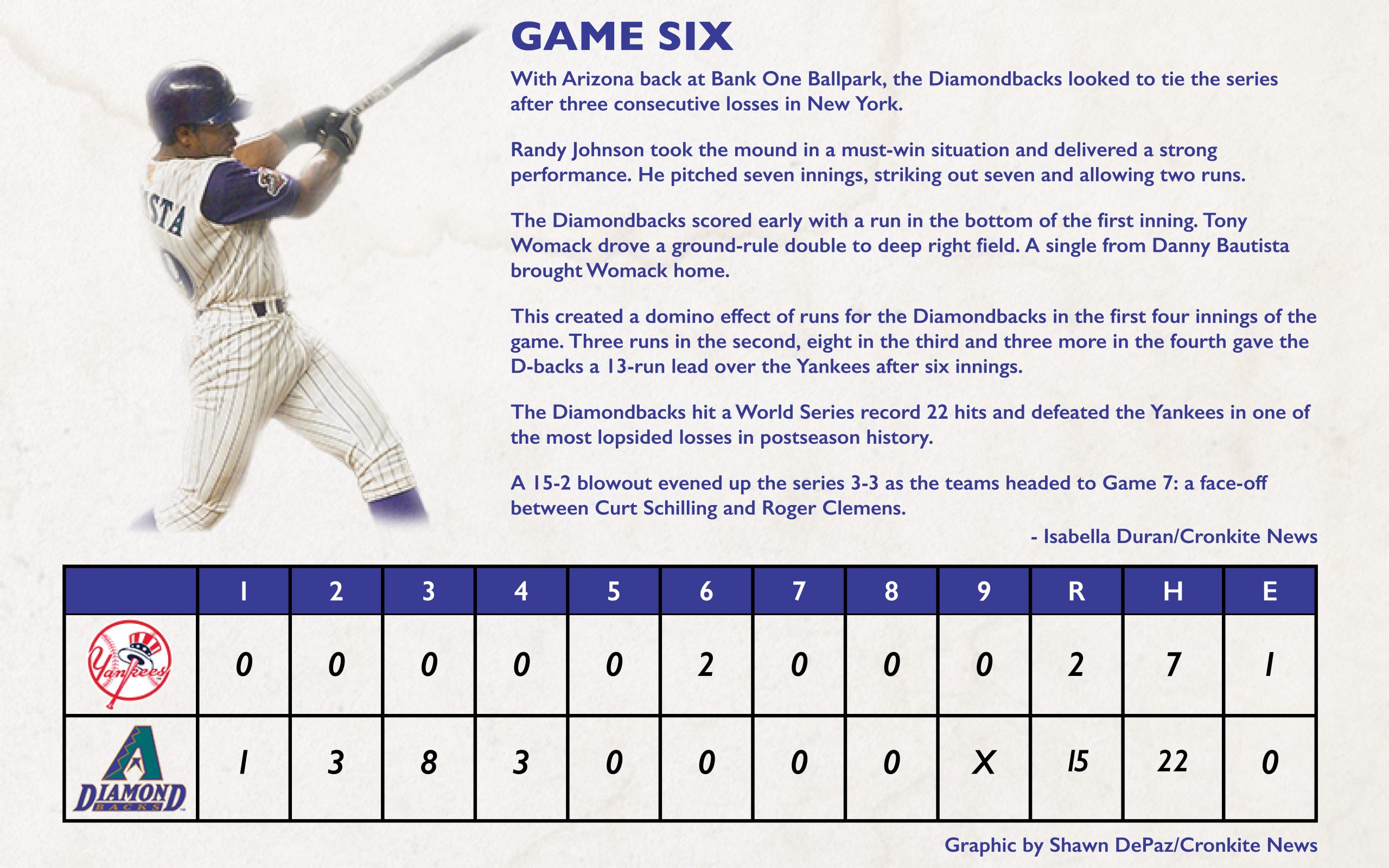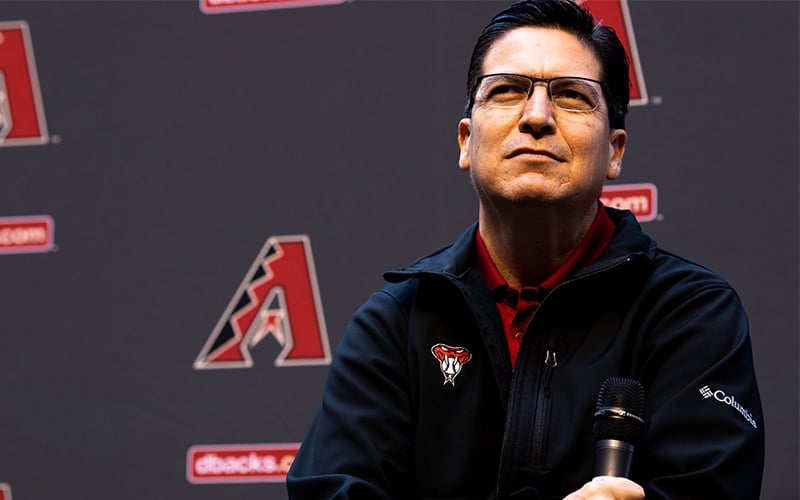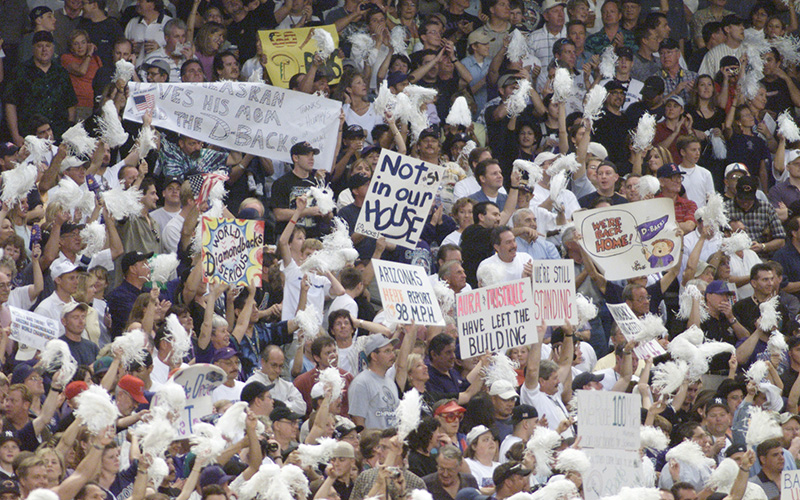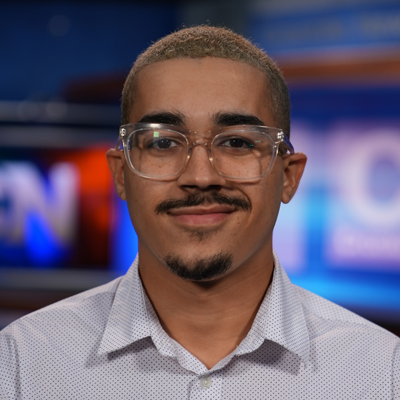This is the fourth in a series of stories looking at the Arizona Diamondbacks’ World Series run.
PHOENIX – Virtually every Arizona Diamondbacks fan knows how Game 7 of the 2001 World Series ended, with radio play-by-play man Greg Schulte exclaiming, “Diamondbacks win! They’re the world champions! Gonzalez did it!” as Luis Gonzalez’s bloop single scored Jay Bell with the game-winning run that toppled the New York Yankees.
Thousands of Diamondbacks fans, however, remember a different version of that moment, the one described by Oscar Soria, who played an equally important role in the story of the 2001 Diamondbacks.
Soria is the Spanish television and radio analyst of the Diamondbacks, who joined the club in 1999 as the organization tried to make inroads with Latino fans on both sides of the Mexican-U.S. border almost from the moment the franchise was born.
And by 2001, those fans had already become emotionally invested in the Diamondbacks long before Gonzalez dumped that single into history. And after that moment, Soria was almost as big of a hero to those Spanish-speaking listeners as Gonzo.
“I never won a game, I never hit a single, I never hit a homer but the fans congratulated me as if I was a player,” Soria said.
Born in the Mexican state of Baja California, Soria grew up in Sonora, a Mexican state located directly south of Arizona. Baseball was all anyone talked about with Soria there, and in the 1970s he was a big fan of Naranjeros de Hermosillo, the local baseball team that competes in the Mexican Pacific League.
“Baseball in Sonora is number one, especially in those years,” Soria said.
He joined the Diamondbacks broadcast team in the franchise’s second season, and his timing couldn’t have been much better. That 1999 Arizona club won 100 games. Even the World Series team didn’t accomplish that, and neither has any other Diamondbacks team since.

“I was thinking those years that it was so easy to win a World Series,” Soria said, chuckling.
The franchise already had taken pains to establish ties with the Latino community, something that’s been a challenge for many professional sports teams to this day. The Hispanic community made up approximately 30% of the Phoenix population in 2000, according to Census Viewer.
And there were many more potential Latino fans around the state and south of the border. The Diamondbacks forged a relationship with Sonora that would allow the team to travel across the border and play exhibition games in the city of Hermosillo.
“It was that relationship with the Mexican community that we saw, with the team playing in Sonora, how many fans had Diamondbacks merchandise,” Soria said.
The team continues to tap into that market. It recently released jerseys with “Serpientes” written across the chest that pay homage to the Hispanic community in Arizona and that could have an economic benefit. Latino buying power is expected to to reach $57.2 billion in Arizona by 2022, according to the 24th annual DATOS report, “The State of Arizona’s Hispanic Market,” released in October by the Arizona Hispanic Chamber of Commerce.
“What these jerseys have done is just open the eyes of people that maybe hadn’t seen that before,” said Emilio Gaynor, the chair of the Los D-backs Ambassadors Council.
Though the team is located in Arizona, its reach extends beyond state lines and has since the beginning.
“We were proud during that World Series because we knew a lot of Latin fans were so excited,” Soria said.
Such is the team’s influence in northern Mexico. Many people there refer to the Diamondbacks as “the new Sonora team,” Soria said.
“Especially Sonora people, Chihuahua people, Baja California people, I think they feel that the D-backs are their team,” he said.
Following their World Series victory, the Diamondbacks brought their world championship trophy with them when they traveled to Sonora for their annual exhibition games, allowing fans to see the prize while also seeing their favorite players up close and personal.
“There are not a lot of exhibition games in Mexico, so there was an opportunity for people, in states not only from Sonora, to go to Hermosillo to attend and see MLB games,” Soria said.
Of course, the 2001 World Series was played against the somber backdrop of the Sept. 11, 2001, terrorist attacks on the World Trade Center and the Pentagon.
Soria recalls visiting Ground Zero where the World Trade Center’s twin towers had stood along with other members of the Diamondbacks contingent and players. The Spanish broadcaster remembers pitcher Curt Schilling telling firefighters and rescue workers they were the true heroes, not the baseball players.
“I remember that Schilling said something like, ‘And sorry, but we want to beat the Yankees.’ But people there responded and said, ‘Oh no, beat the Yankees because we’re Mets fans,’” Soria said, laughing.
The Latino community continues to play an important role in the Diamondbacks’ story. And if the Diamondbacks ever return to those glory days of 100-win seasons and World Series trophies, Soria is likely to be there to make the call.
“Now, 20 years after, I realize how big of a moment it was,” Soria said.




